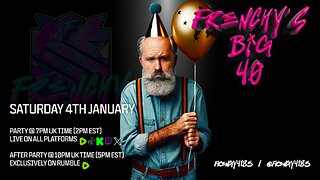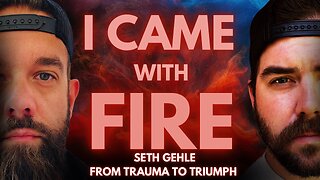Premium Only Content

BIG IN JAPAN JOHN PEEL SESSION 1979.
-------------------------------------------
WHY NOT SUPPORT YOUR YOUTUBE CHANNEL BY BUYING ME A COFFEE AT
Ko-fi.com/punkrocknineteenseventies
------------------------------------------------------------
Big in Japan were a punk band that emerged from Liverpool, United Kingdom in the late 1970s. They are better known for the later successes of their band members than for their own music.
History
Big in Japan began from the same Merseyside scene which would produce Echo & the Bunnymen, the Teardrop Explodes, OMD and Dalek I Love You.
Big in Japan started off playing gigs around Liverpool, such as Ruffwood School in Kirkby along with Wah! Heat, but most notably at Eric's Club.[1] Their stage show was unique: lead singer Jayne Casey would perform with a lampshade over her shaved head, guitarist Bill Drummond played in a kilt and bassist Holly Johnson performed in a flamboyant manner which he would later take further in Frankie Goes to Hollywood.
As an initial idea of Deaf School's Clive Langer, his friend Bill Drummond (guitar, vocals), Kevin Ward (bass, vocals) and Phil Allen (drums), formed the band in May 1977, playing only three gigs, the first of them at Bretton Hall College, in Yorkshire.[2] In August, the line-up grew, joining Jayne Casey (vocals), Ian Broudie (guitar) and Clive Langer (guitar), who quit in September, but not before the band recorded their first song released, "Big in Japan", which appeared on the split single "Brutality, Religion and a Dance Beat", released the same year. In October, Ambrose Reynolds joined to replace Ward who then left that December, but Reynolds himself quit shortly afterwards and was replaced by Holly Johnson.[3] In January 1978, Budgie (previously in the Spitfire Boys and later member of the Slits and Siouxsie and the Banshees) replaced Allen on drums, and in early June, Johnson was sacked and replaced with ex-Deaf School Steve Lindsey, who was replaced in July by Dave Balfe (previously in Dalek I Love You), the last member to join.[4][5]
Hatred of the band reached such a level that a petition calling on them to split up was launched by a jealous young Julian Cope resulting from a rivalry with the Crucial Three.[6] Displayed in local shop Probe Records, the petition gathered numerous signatures, including those of the band themselves.[7] According to Cope's autobiography, "Of course, Bill Drummond was into the whole thing and told us we needed 14,000 signatures, then they'd split up. We got about nine".[8] In the 1980s, Drummond became manager of Cope's band, the Teardrop Explodes.
The band broke up after a last gig at Eric's on 26 August 1978. During their time, Big in Japan recorded four songs which were included on the From Y to Z and Never Again EP, released afterwards to pay off debts. The unintentional consequence of the EP was the formation of the Zoo label, which went on to release early material by Echo & the Bunnymen and the Teardrop Explodes, amongst others. They also recorded a Peel Session on 12 February 1979, with a line-up of Casey, Broudie, Johnson and Budgie; the session was broadcast on 6 March 1979.[9] Balfe and Drummond then formed the short-lived Lori and the Chameleons.
Big in Japan left a recorded legacy of seven songs: one on a single, four on their EP From Y to Z and Never Again, and two released on compilation albums. As of 2005, five out of these recorded songs are commercially available, on the compilation album The Zoo: Uncaged 1978–1982.[10]
According to the Liverpool Echo, Big in Japan were "a supergroup with a difference—its members only became super after they left";[1] former members of Big in Japan would later find fame in the KLF, Frankie Goes to Hollywood, the Lightning Seeds, the Teardrop Explodes and Siouxsie and the Banshees.[11]
The first single of German band Alphaville was called "Big in Japan", named directly after the band.[12] Coincidentally, Frankie Goes to Hollywood's single "Relax" was displaced from the top of the German charts by Alphaville's "Big in Japan".[13][14] Singer/songwriter Marian Gold later said that "we never got to speak with him [Holly Johnson] but he must have wondered 'who is this German group with a song named after my band?
-
 29:53
29:53
MYLUNCHBREAK CHANNEL PAGE
1 day agoOff Limits to the Public - Pt 1
67.7K103 -
 16:03
16:03
Tundra Tactical
7 hours ago $6.80 earnedNew Age Gun Fudds
89.5K14 -
 8:22
8:22
Russell Brand
12 hours agoThey want this to happen
165K342 -
 2:06:43
2:06:43
Jewels Jones Live ®
1 day ago2025 STARTS WITH A BANG! | A Political Rendezvous - Ep. 104
96.2K35 -
 4:20:41
4:20:41
Viss
12 hours ago🔴LIVE - PUBG Duo Dominance Viss w/ Spartakus
72.3K9 -
 10:15:14
10:15:14
MDGgamin
15 hours ago🔴LIVE-Escape From Tarkov - 1st Saturday of 2025!!!! - #RumbleTakeover
59.9K2 -
 3:54:19
3:54:19
SpartakusLIVE
11 hours agoPUBG Duos w/ Viss || Tactical Strategy & HARDCORE Gameplay
72.1K1 -
 5:54:54
5:54:54
FRENCHY4185
12 hours agoFRENCHY'S BIRTHDAY BASH !!! THE BIG 40 !!!
81.6K3 -
 1:23:33
1:23:33
Michael Franzese
20 hours agoThings to look forward to in 2025
101K47 -
 3:23:02
3:23:02
I_Came_With_Fire_Podcast
21 hours agoDefeating VICTIMHOOD: Advocacy, Resiliency, and Overcoming Abuse
104K19